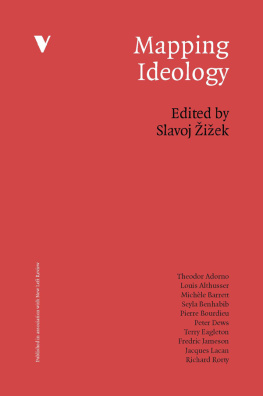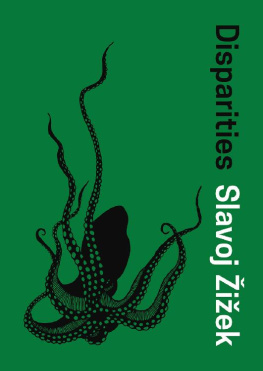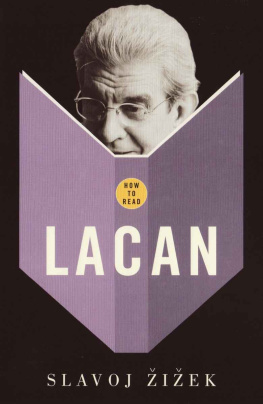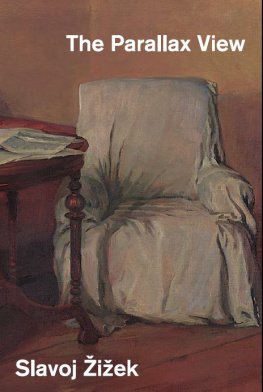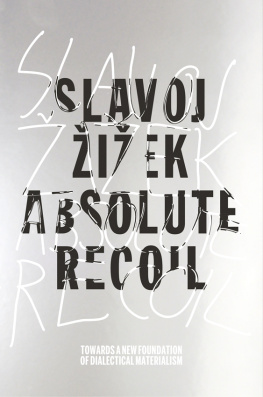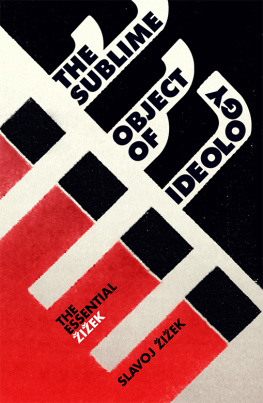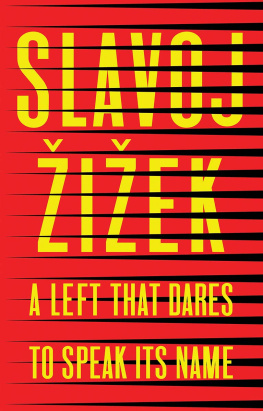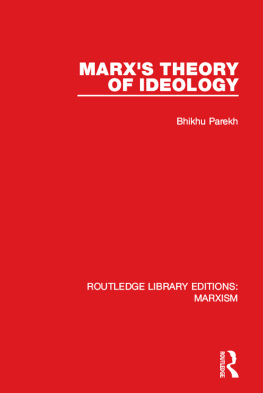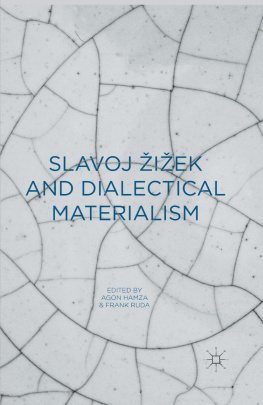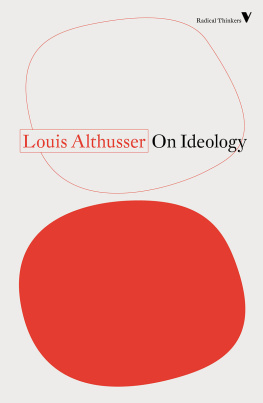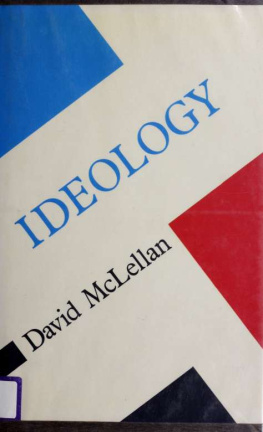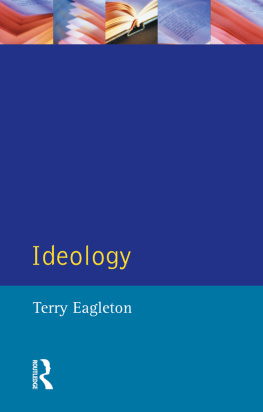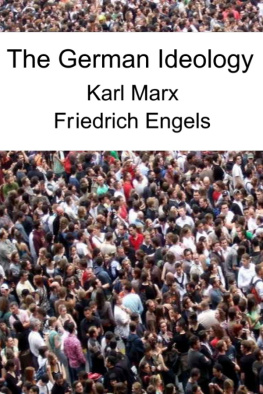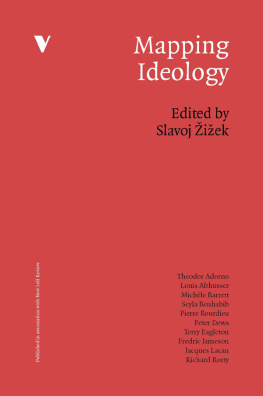Theodor W. Adorno
Nicholas Abercrombie Stephen Hill and Bryan S. Turner
Slavoj iek
I Critique of Ideology, today?
By way of a simple reflection on how the horizon of historical imagination is subjected to change, we find ourselves in medias res , compelled to accept the unrelenting pertinence of the notion of ideology. Up to a decade or two ago, the system production-nature (mans productive-exploitative relationship with nature and its resources) was perceived as a constant, whereas everybody was busy imagining different forms of the social organization of production and commerce (Fascism or Communism as alternatives to liberal capitalism); today, as Fredric Jameson perspicaciously remarked, nobody seriously considers possible alternatives to capitalism any longer, whereas popular imagination is persecuted by the visions of the forthcoming breakdown of nature, of the stoppage of all life on earth it seems easier to imagine the end of the world than a far more modest change in the mode of production, as if liberal capitalism is the real that will somehow survive even under conditions of a global ecological catastrophe.... One can thus categorically assert the existence of ideology qua generative matrix that regulates the relationship between visible and non-visible, between imaginable and non-imaginable, as well as the changes in this relationship.
This matrix can be easily discerned in the dialectics of old and new, when an event that announces a wholly new dimension or epoch is (mis)perceived as the continuation of or return to the past, or the opposite case when an event that is entirely inscribed in the logic of the existing order is (mis)perceived as a radical rupture. The supreme example of the latter, of course, is provided by those critics of Marxism who (mis)perceive our late-capitalist society as a new social formation no longer dominated by the dynamics of capitalism as it was described by Marx. In order to avoid this worn-out example, however, let us turn to the domain of sexuality. One of todays commonplaces is that so-called virtual or cyber sex presents a radical break with the past, since in it, actual sexual contact with a real other is losing ground against masturbatory enjoyment, whose sole support is a virtual other phone-sex, pornography, up to computerized virtual sex.... The Lacanian answer to this is that first we have to expose the myth of real sex allegedly possible before the arrival of virtual sex: Lacans thesis that there is no sexual relationship means precisely that the structure of the real sexual act (of the act with a flesh-and-blood partner) is already inherently phantasmic the real body of the other serves only as a support for our phantasmic projections. In other words, virtual sex in which a glove simulates the stimuli of what we see on the screen, and so on, is not a monstrous distortion of real sex, it simply renders manifest its underlying phantasmic structure.
An exemplary case of the opposite misperception is provided by the reaction of Western liberal intellectuals to the emergence of new states in the process of the disintegration of real Socialism in Eastern Europe: they (mis)perceived this emergence as a return to the nineteenth-century tradition of the nation-state, whereas what we are actually dealing with is the exact opposite: the withering-away of the traditional nation-state based upon the notion of the abstract citizen identified with the constitutional legal order. In order to characterize this new state of things, tienne Balibar recently referred to the old Marxian phrase Es gibt keinen Stoat in Europa there no longer exists a proper state in Europe. The old spectre of Lviathan parasitizing on the Lebenswelt of society, totalizing it from above, is more and more eroded from both sides. On the one hand, there are the new emerging ethnic communities although some of them are formally constituted as sovereign states, they are no longer states in the proper modern-age European sense, since they did not cut the umbilical cord between state and ethnic community. (Paradigmatic here is the case of Russia, in which local mafias already function as a kind of parallel power structure.) On the other hand, there are the multiple transnational links, from multinational capital to mafia cartels and inter-state political communities (European Union).
There are two reasons for this limitation of state sovereignty, each of which is in itself compelling enough to justify it: the transnational character of ecological crisis and of nuclear threat. This eroding of state authority from both sides is mirrored in the fact that today the basic political antagonism is that between the universalist cosmopolitical liberal democracy (standing for the force corroding the state from above) and the new organic populism-communitarianism (standing for the force corroding the state from below). And as Balibar pointed out yet again this antagonism is to be conceived neither as an external opposition nor as the complementary relationship of the two poles in which one pole balances the excess of its opposite (in the sense that, when we have too much universalism, a little bit of ethnic roots gives people the feeling of belonging, and thus stabilizes the situation), but in a genuinely Hegelian sense each pole of the antagonism is inherent to its opposite, so that we stumble upon it at the very moment when we endeavour to grasp the opposite pole for itself, to posit it as such.
Because of this inherent character of the two poles, one should avoid the liberal-democratic trap of concentrating exclusively on the horrifying facts and even more horrifying potentials of what is going on today in Russia and some other ex-Communist countries: the new hegemonic ideology of Eurasism preaching the organic link between community and the state as an antidote to the corrosive influence of the Jewish principle of market and social atomism, orthodox national imperialism as an antidote to Western individualism, and so on. In order to combat these new forms of organicist populism effectively one must, as it were, turn the critical gaze back upon oneself and submit to critical scrutiny liberal-democratic universalism itself what opens up the space for the organicist populism is the weak point, the falsity, of this very universalism.
These same examples of the actuality of the notion of ideology, however, also render clear the reasons why today one hastens to renounce the notion of ideology: does not the critique of ideology involve a privileged place, somehow exempted from the turmoils of social life, which enables some subject-agent to perceive the very hidden mechanism that regulates social visibility and non-visibility? Is not the claim that we can accede to this place the most obvious case of ideology? Consequently, with reference to todays state of epistemological reflection, is not the notion of ideology self-defeating? So why should we cling to a notion with such obviously outdated epistemological implications (the relationship of representation between thought and reality, etc.)? Is not its utterly ambiguous and elusive character in itself a sufficient reason to abandon it? Ideology can designate anything from a contemplative attitude that misrecognizes its dependence on social reality to an action-orientated set of beliefs, from the indispensable medium in which individuals live out their relations to a social structure to false ideas which legitimate a dominant political power. It seems to pop up precisely when we attempt to avoid it, while it fails to appear where one would clearly expect it to dwell.

